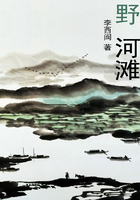William Clodd, mopping his brow, laid down the screwdriver, and stepping back, regarded the result of his labours with evident satisfaction.
"It looks like a bookcase," said William Clodd. "You might sit in the room for half an hour and never know it wasn't a bookcase."
What William Clodd had accomplished was this: he had had prepared, after his own design, what appeared to be four shelves laden with works suggestive of thought and erudition. As a matter of fact, it was not a bookcase, but merely a flat board, the books merely the backs of volumes that had long since found their way into the paper-mill. This artful deception William Clodd had screwed upon a cottage piano standing in the corner of the editorial office of Good Humour. Half a dozen real volumes piled upon the top of the piano completed the illusion. As William Clodd had proudly remarked, a casual visitor might easily have been deceived.
"If you had to sit in the room while she was practising mixed scales, you'd be quickly undeceived," said the editor of Good Humour, one Peter Hope. He spoke bitterly.
"You are not always in," explained Clodd. "There must be hours when she is here alone, with nothing else to do. Besides, you will get used to it after a while."
"You, I notice, don't try to get used to it," snarled Peter Hope.
"You always go out the moment she commences."
"A friend of mine," continued William Clodd, "worked in an office over a piano-shop for seven years, and when the shop closed, it nearly ruined his business; couldn't settle down to work for want of it."
"Why doesn't he come here?" asked Peter Hope. "The floor above is vacant."
"Can't," explained William Clodd. "He's dead."
"I can quite believe it," commented Peter Hope.
"It was a shop where people came and practised, paying sixpence an hour, and he had got to like it--said it made a cheerful background to his thoughts. Wonderful what you can get accustomed to."
"What's the good of it?" demanded Peter Hope.
"What's the good of it!" retorted William Clodd indignantly.
"Every girl ought to know how to play the piano. A nice thing if when her lover asks her to play something to him--"
"I wonder you don't start a matrimonial agency," sneered Peter Hope. "Love and marriage--you think of nothing else."
"When you are bringing up a young girl--" argued Clodd.
"But you're not," interrupted Peter; "that's just what I'm trying to get out of your head. It is I who am bringing her up. And between ourselves, I wish you wouldn't interfere so much."
"You are not fit to bring up a girl."
"I've brought her up for seven years without your help. She's my adopted daughter, not yours. I do wish people would learn to mind their own business."
"You've done very well --"
"Thank you," said Peter Hope sarcastically. "It's very kind of you. Perhaps when you've time, you'll write me out a testimonial."
"--up till now," concluded the imperturbable Clodd. "A girl of eighteen wants to know something else besides mathematics and the classics. You don't understand them."
"I do understand them," asserted Peter Hope. "What do you know about them? You're not a father."
"You've done your best," admitted William Clodd in a tone of patronage that irritated Peter greatly; "but you're a dreamer; you don't know the world. The time is coming when the girl will have to think of a husband."
"There's no need for her to think of a husband, not for years," retorted Peter Hope. "And even when she does, is strumming on the piano going to help her?"
"I tink--I tink," said Dr. Smith, who had hitherto remained a silent listener, "our young frent Clodd is right. You haf never quite got over your idea dat she was going to be a boy. You haf taught her de tings a boy should know."
"You cut her hair," added Clodd.
"I don't," snapped Peter.
"You let her have it cut--it's the same thing. At eighteen she knows more about the ancient Greeks and Romans than she does about her own frocks."
"De young girl," argued the doctor, "what is she? De flower dat makes bright for us de garden of life, de gurgling brook dat murmurs by de dusty highway, de cheerful fire--"
"She can't be all of them," snapped Peter, who was a stickler for style. "Do keep to one simile at a time."
"Now you listen to plain sense," said William Clodd. "You want--we all want--the girl to be a success all round."
"I want her--" Peter Hope was rummaging among the litter on the desk. It certainly was not there. Peter pulled out a drawer-two drawers. "I wish," said Peter Hope, "I wish sometimes she wasn't quite so clever."
The old doctor rummaged among dusty files of papers in a corner.
Clodd found it on the mantelpiece concealed beneath the hollow foot of a big brass candlestick, and handed it to Peter.
Peter had one vice--the taking in increasing quantities of snuff, which was harmful for him, as he himself admitted. Tommy, sympathetic to most masculine frailties, was severe, however, upon this one.
"You spill it upon your shirt and on your coat," had argued Tommy.
"I like to see you always neat. Besides, it isn't a nice habit. I do wish, dad, you'd give it up."
"I must," Peter had agreed. "I'll break myself of it. But not all at once--it would be a wrench; by degrees, Tommy, by degrees."















